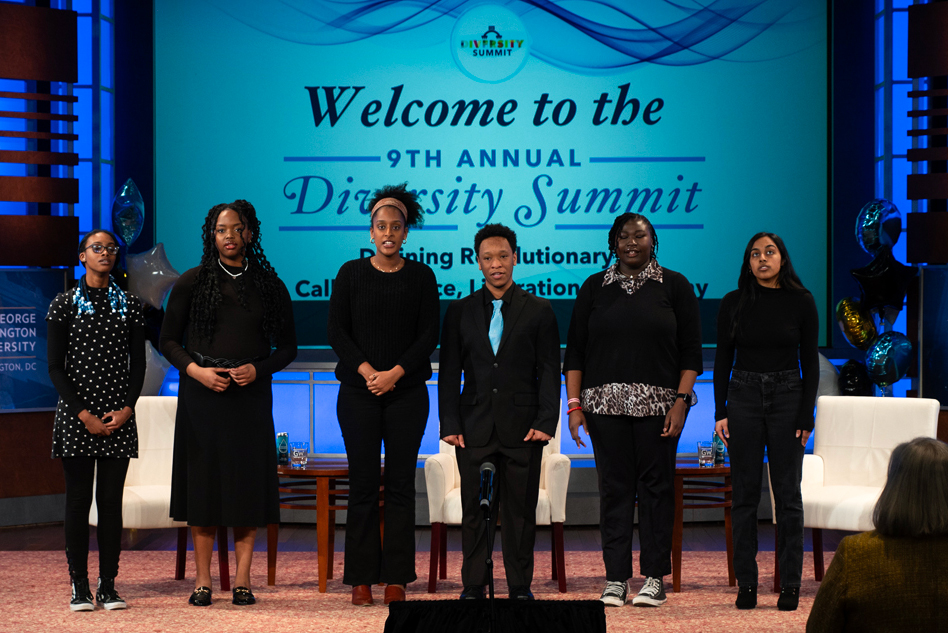The Office of Diversity, Equity and Community Engagement hosted more than 40 events on topics like inequalities in LGBTQ+ health care, Indigenous rights and combating white supremacy for GW’s ninth-annual Diversity Summit last week.
This year’s theme, “Defining Revolutionary: A Call for Justice, Liberation, and Empathy,” focused on navigating conflict, finding mutual humanity and combating “all forms of oppression,” according to the summit’s website. The summit was originally planned to be two parts — the first installment in October — but officials postponed the fall series and moved the programming entirely to last week in response to campus tensions following members of Students for Justice in Palestine’s anti-Israel projections onto Gelman Library.
The summit kicked off with a keynote session called “The Promise of Pluralism in Times of Tension” led by Rebecca Russo and Jenan Mohajir — officials from Interfaith America, an organization dedicated to preserving religious diversity. The panelists spoke from their experiences as Jewish and Muslim women about how college campuses can address religious and political tension among students after the outbreak of the Israel-Hamas war, including by being a place where people can listen to differing perspectives.
Students, faculty and community members collaborated to organize programming revolving around civil conversation, identity expression and social activism on the third floor of the University Student Center.
Miki Nishida Goerdt, an adjunct faculty member in the Graduate Art Therapy Program, organized an art exhibition Wednesday and Thursday called “Am I Welcome Here?” where international students showcased original art highlighting their experiences in finding a sense of belonging.
“We collectively acknowledge that there is a sense of invisibility and the feeling of not being heard and seen, especially through the cultural layers that they carry,” Goerdt said.
Senior Xinhang Xu featured her painting at the exhibition and said she was grateful to have a space for international students to display their struggles and experiences. She said her artwork served as a metaphor for her experience as an international student and the continued state of uneasiness while attempting to assimilate to peers, according to her artist statement.
“This is actually my first opportunity here as a fourth-year undergrad to show my works and show my thinking behind those to like such a large group of audience,” Xu said. “I think this is really important for us not only as international students but also as art students.”
GlobeMed at GWU — an organization dedicated to reaching global health equity — hosted an “Engaging in Anti-Oppressive Advocacy and Community-Building” event Wednesday in the student center, which featured a panel of students from the organization. The panelists spoke about how the organization is working with their partner organization, Set Her Free — an organization in Uganda that supports young women facing sexual exploitation and child labor — to take more inclusive and equitable approaches to global health initiatives.
Senior and co-president of GlobeMed at GW Sadhana Matheswaran said the organization participated in the summit for the first time this year because of the theme’s focus on revolution. She said the organization has been working to improve their practices, like actively recognizing their privilege and changing their mindsets on oppression based on their experiences with their international partners.
“Over the past two years, GW GlobeMed was definitely having some issues in terms of creating a more inclusive space where everyone can come together and be represented,” Matheswaran said. “We started to implement more anti-oppressive approaches to community building and advocacy, and that really brought our community together and that approach is something that we wanted to share at the Diversity Summit.”
Junior Manasa Sharma, a partner liaison for GlobeMed at GW, attended the panel and said it allowed her to reflect on the privileges she has as a GW student and the experiences of students of color at the University.
“It’s definitely very important because, at the end of the day, GW is a predominantly white institution and when we create spaces for people of color, and people from different backgrounds, we have to ensure that these spaces are equitable, and we are culturally sensitive, especially in spaces where maybe there’s a lack of people of color, lack of diverse identities,” Sharma said. “I feel like creating those spaces and making sure that people can feel comfortable is so important.”
Dr. Maranda Ward, an assistant professor and director of equity in the Department of Clinical Research and Leadership in the GW School of Medicine and Health Sciences, led the “‘Rest as Resistance’: Combating White Supremacy and Grind Culture via Restorative Yoga” session Wednesday where students were able to relax and stretch with Dr. Jameta Barlow, an assistant professor of writing in the University Writing and Women’s Leadership programs.
Ward said she and Barlow decided to use yoga in their session because they wanted to give people of color an opportunity to take a break from the burdens that they face, like educating others on oppression while also experiencing it.
Ward said the session aimed to teach students that rest is valuable and offered extra credit to her students to encourage them to attend the session, a practice she hopes more faculty will utilize to encourage their students to participate in future summits.
“When it comes to diversity, equity, inclusion, justice, anti-racism, belonging, types of efforts on college campuses and beyond, typically the people of color are the ones tasked to champion and take the lead on it, and that is emotionally draining and exhausting, especially when we’re not compensated for that time or we’re expected to do it on top of the position that we do have,” Ward said.





